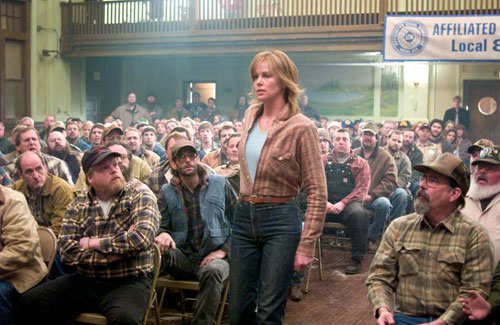
Stereotype: A conventional, formulaic, and oversimplified conception, opinion, or image; One that is regarded as embodying or conforming to a set image or type.
“North Country” is a 2005 movie about the very first class action sexual harassment lawsuit in the United States. The film was based upon a book entitled “Class Action,” published in 2002.
 Both tell the story of Lois Jenson, portrayed in an Oscar-nominated performance by Charlize Theron, a single mother who was among the first women hired in 1975 to work in a northern Minnesota iron mine. The factual underpinning is typical of the allegations lodged by women who were, in the 1970’s and 80’s, among the first to break into professions traditionally held by men such as police officer, firefighter or construction worker: Jenson and the other female miners were the subject of pornographic graffiti in the workplace, degrading and hostile language, stalking, physical and sexual assaults. Most of the women were terrified at the prospect of losing their jobs, so they did not report the behavior to which they were subjected.
Both tell the story of Lois Jenson, portrayed in an Oscar-nominated performance by Charlize Theron, a single mother who was among the first women hired in 1975 to work in a northern Minnesota iron mine. The factual underpinning is typical of the allegations lodged by women who were, in the 1970’s and 80’s, among the first to break into professions traditionally held by men such as police officer, firefighter or construction worker: Jenson and the other female miners were the subject of pornographic graffiti in the workplace, degrading and hostile language, stalking, physical and sexual assaults. Most of the women were terrified at the prospect of losing their jobs, so they did not report the behavior to which they were subjected.
“Work hard, keep your mouth shut, and take it like a man.”
In 1984, however, Jenson mustered the courage to complain and, along with her fellow plaintiffs, eventually prevailed with their ground-breaking lawsuit.
Jenson was a true pioneer who, because of her courage and conviction, helped to immeasurably improve the working conditions of all American women.
Consider the advise Jenson received from her first-level supervisor (brilliantly played by Xander Berkeley) when she brought the women’s concerns to his attention.
“Work hard, keep your mouth shut, and take it like a man.” Can you imagine any male supervisor admonishing a female subordinate in that manner in 2008? Sadly, I can. Sexual harassment continues to be a major problem in American workplaces that crosses gender lines.
 As writers, we have an obligation to understand our audience and be mindful of the language we employ to communicate our ideas and opinions. We have a responsibility to treat our readers with respect and, unless we are deliberately seeking to stir up controversy, use language carefully so as to avoid insulting or belittling them. It is impossible to anticipate the reaction to what we right of every individual reader and, of course, we cannot know what topics might be “hot buttons” for our audiences that will evoke particularly emotional responses. Accordingly, we must approach each post or article from the most broadly dignified manner possible. Bloggers must resist the temptation to resort to stereotypical, gender-specific terminology to make a point.
As writers, we have an obligation to understand our audience and be mindful of the language we employ to communicate our ideas and opinions. We have a responsibility to treat our readers with respect and, unless we are deliberately seeking to stir up controversy, use language carefully so as to avoid insulting or belittling them. It is impossible to anticipate the reaction to what we right of every individual reader and, of course, we cannot know what topics might be “hot buttons” for our audiences that will evoke particularly emotional responses. Accordingly, we must approach each post or article from the most broadly dignified manner possible. Bloggers must resist the temptation to resort to stereotypical, gender-specific terminology to make a point.
I recently read How to Handle Legal Issues Like a Man and was horrified to find that the post appeared on a blog maintained by a practicing attorney.
A photograph of a boxing glove introduces a discussion of how “true men” should handle legal issues like “gentlemen,” i.e., in a mature, cooperative, civil manner. (” Handling legal issues like a man means being a gentleman.”) Thus, the language employed to discuss the otherwise meritorious issue of an overall lack of civility in the legal profession, which has been the object of ongoing debate in California legal circles for a long time, is as outdated, misogynistic, and offensive as the title. The article concludes: “You’ll be surprised what being a gentleman will do for your business.”
One of the author’s readers jumped to his defense, arguing that the article was written specifically for men. That commenter contends that “[w]omen write articles targeted at women often. Allow men to write articles targeted at men. Both tend to contain valuable lessons that are cross-gender compatible.” Another commenter argued:
We’re looking at the dirty stereotype that unfortunately too many men live up to (being vulgar and disrespectful individuals) we’re trying to clean it up, making no mistake that men should act like gentlemen. I am always pleased when I have evidence of a strong woman that shows that a lady is not supposed to be an unsuccessful pushover, but a capable individual. She characterized as a lady because of her gender and most importantly because she lives up to all the same virtues that define a gentleman.
Such condescending platitudes only exacerbate the existing problem: The use of gender-stereotypical or hostile language and images derail a writer’s credibility and alienate one’s audience.
I am a successful attorney. I happen to be a woman. I have no desire to be referred to as a “girl,” “chick,” “gal,” or even “lady.” Any and all of those terms are demeaning and degrading when related to professional endeavors. A male attorney who writes an article “targeted at men” telling them how to conduct themselves during a legal skirmish is equally degrading because, in doing so, he insinuates and tacitly suggests that women will have no place in the legal battle.
Professional attributes such as civility, integrity, honesty, and competence are not gender-specific and discussions about those characteristics should never be couched in outdated, stereotypical verbiage detailing how “ladies” or “gentlemen” behave.
If you want your audience to respect, admire and, most importantly, continue reading your work, I strongly urge you to employ a dignified tone and utilize non-gender-hostile language. In short, don’t ever tell me how to “handle” or “take” a particular problem “like a man.”
(See also “Is it time for Hillary to take a loss like a man?”)
Check back next Monday, June 9, 2008, to read Part Two!


3 Comments
I am the author of the post linked to above: How to Handle Legal Issues Like a Man. Please note the very first sentence of the article that I wrote: “Unfortunately many males in our society do not handle their problems like true men.” The article was solely intended to encourage people of the male gender to conduct themselves in a well-mannered, civilized fashion.
Interesting read! Very intriguing blog post! Thanks for sharing!
Jennas last blog post..Mark Your Calendars: Raleigh Yoga in the Park
“he insinuates and tacitly suggests that women will have no place in the legal battle.”
The arguement you’re suggesting could be summarized as:
1. All males who act like men will be persons who succeed in a legal skirmish (from the article)
2. All females are not males
3. Therefore all persons who succeed in a legal skirmish are males
This conclusion cannot be reached from these premises. Just because “a male acting like a man” is sufficient to be successful (restating premise 1) does not mean that it is necessary to being successful. The article’s author is suggesting that “males acting like a man” is one method. He does not state or imply that it is the only method.